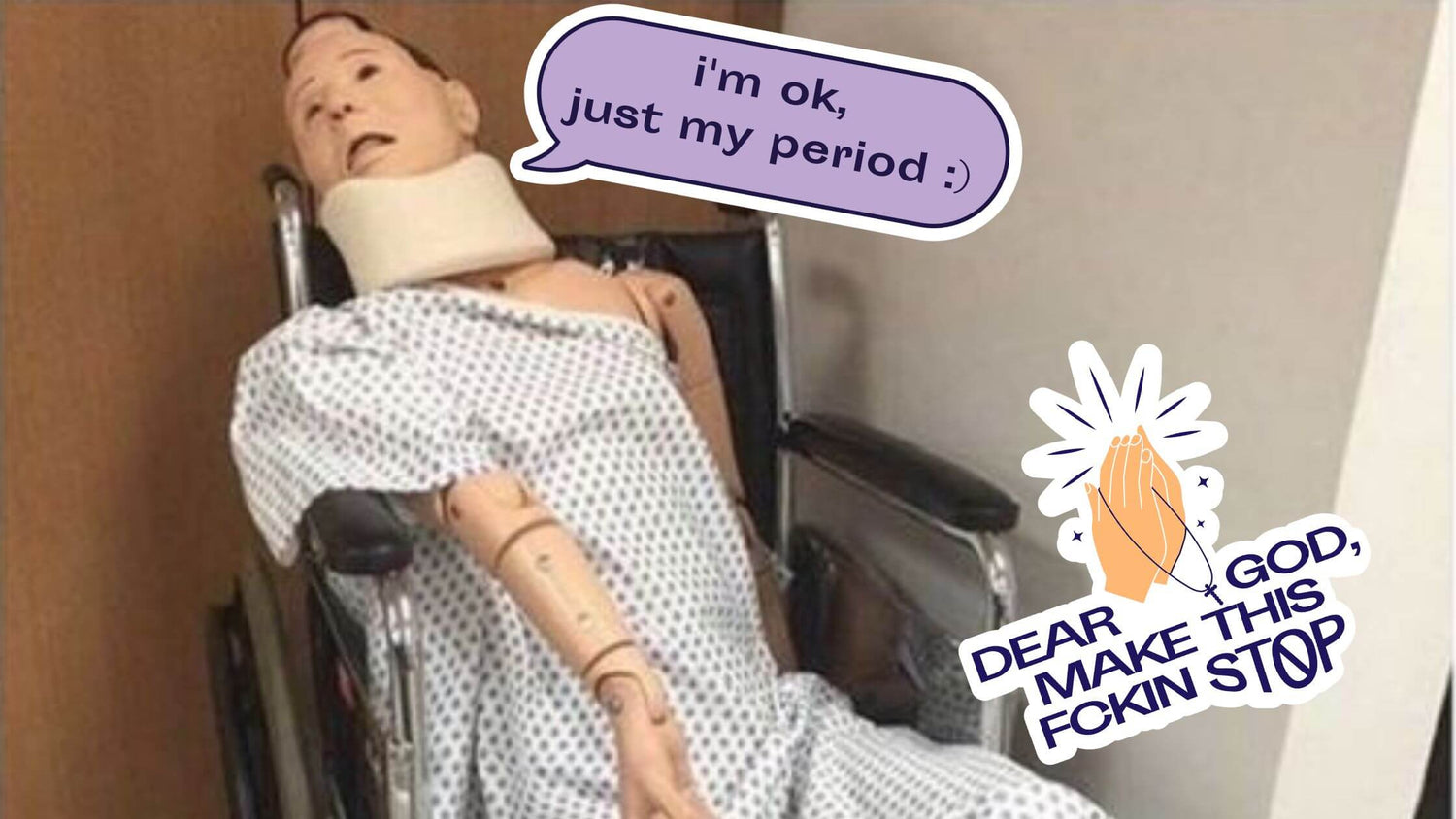Bloating is a relatively common symptom to experience when you’re on your period. Many women complain of feeling gassy, swollen, and tight around their abdomen when they’re menstruating.
You can thank your reproductive hormones for period bloating. In particular, oestrogen and progesterone are responsible for causing increased water and salt retention, leading to bloating.
Usually, period bloating appears a few days before you start bleeding and disappears one or two days into menstruation. It can be uncomfortable and even painful at times and while you may not be able to completely eliminate period bloating, there are things that you can do to reduce its severity.
How Can You Reduce Period Bloating?
Bloating is one of the most common symptoms associated with the lead-up to the menstruation phase of the menstrual cycle, but that doesn’t mean you need to suffer for several days every month!
Check out these top ways to reduce period bloating or potentially eliminate it altogether.
Choose low-sodium, high-potassium foods
The foods you eat leading up to and during your period can impact how much bloating you experience. This is because certain foods and nutrients affect your gut motility and the water balance in your body.
It’s important to avoid high-sodium foods if you’re prone to bloating. Foods that are abundant in sodium can increase water retention in your gastrointestinal tract, worsening your bloating.
Instead, try to choose foods that are high in potassium. This will counteract the effects of sodium by reducing water retention and increasing water loss. Potassium is abundant in avocados, bananas, dried fruit, lentils, and potatoes.
You should also limit your intake of junk foods and processed foods. As tempting as it is to eat a bunch of comfort foods when you’re on your period, this can sometimes make you feel worse. Processed foods are often high in sodium, and, as we mentioned above, this mineral can exaggerate period bloating.
Take Magnesium
Magnesium can also counteract sodium balances, and reduce water retention - that feeling of "puffiness". Studies have shown that magnesium can reduce breast tenderness, headaches, water retention, cramps and bloating during the menstrual cycle.
Avoid gas-producing foods and drinks
Bloating is worsened by the consumption of gas-producing foods and drinks, such as:
- Fruits that are high in sugar, such as bananas, pears, and apples
- Cruciferous vegetables
- Beans
- Legumes
- Fermented foods
- Protein powder supplements
- Sodas
- Fruit juice
- Sparkling water
- Energy drinks
Gas-producing foods contribute to bloating and can cause abdominal discomfort if eaten in large amounts. The best way to cut down the severity of the frequency of bloating is to avoid the above foods as much as you can.
Eat smaller, more frequent meals
It might sound like a relatively obvious way to reduce bloating on your period but try sticking to smaller, more frequent meals over larger, less frequent meals. Doing so gives your digestive system more time to fully break down the foods that you're eating, reducing the risk of bloating.
Stay hydrated
Water is essential for your digestion, and staying hydrated is one of the best ways to prevent constipation and bloating. Drinking plenty of water increases gut motility and supports your body's natural digestive processes for efficient digestion.
Aim to drink around eight glasses of water a day, and perhaps even more while you're on the period. If you exercise while you're menstruating or you have a physically demanding job, you will probably need to drink more than this.
Avoid caffeine and alcohol
Although some people can quite happily drink multiple cups of coffee a day, even when they're menstruating, this isn't the case for everybody. Many women have worsening digestive symptoms when they have one or two cups of coffee during their period.
Both caffeine and alcohol can irritate the digestive tract when you're on your period so if you're able to resist your morning cup of coffee or your evening glass of wine, it's best to do so when you're menstruating!
Caffeine can increase the severity and frequency of period cramps and other symptoms of pre-menstrual syndrome (PMS) because of its inflammatory effects. Alcohol is a diuretic that increases water loss through urination, so it can cause you to become dehydrated. This is especially the case during your luteal phase (the phase between ovulation and your period) where your body needs more water.
Keep up with daily exercise
It can be difficult to keep up with your usual exercise routine when you're on your period. If, like many women, you feel fatigued, unmotivated, and a little dizzy on your period, a high-intensity workout is the last thing you want to do. However, staying physically active during your period can minimise bloating.
You don't need to go to the gym for hours every day during your period. You don't even need to do anything high-intensity if you don't feel like it. Simply walking for 20-30 minutes a day while you're menstruating can be enough to maintain great gut motility and prevent bloating.
Grab your headphones, wrap up warm, and head out for a walk in the fresh air each morning. If you've got a dog, consider taking them for a long walk around the park or take the opportunity to catch up with a friend. Not only will walking aid your digestive processes but it will also offer a distraction if you're feeling low or you're dealing with PMS symptoms.
Take a probiotic
Probiotics are live bacteria that are known to be beneficial for digestion. They can be found naturally in fermented foods and drinks, like yoghurt, sauerkraut, tempeh, kefir, and kombucha. You can also find lots of great probiotic supplements on the market that contain millions of live bacteria to support your gut health and digestion. Most probiotic supplements are tablets or capsules that you swallow.
If you choose to take a probiotic supplement to help with period bloating, make sure it contains at least 1,000,000 CFU (colony forming units) per gram of product. This is the recommended threshold for a probiotic to be effective.
Always buy from a reputable brand that you can trust. Purchasing probiotic supplements from credible brands might cost you more money but it's worth investing in the best products to support your body and digestive health.
Probiotic bacteria, such as Lactobacillus and Bifidobacterium (the ones we use in Wild Dose!) are found naturally in a healthy human gut and they are responsible for supporting the breakdown of food.
They also boost immune function by preventing harmful pathogens from entering your bloodstream from your digestive tract. Some research suggests that beneficial gut microbes also play a crucial role in mental health, thanks to the gut-brain connection.
Take digestive enzymes
Your body produces digestive enzymes endogenously and these enzymes help to break down the food that you eat. If you're prone to period bloating, you might benefit from taking digestive enzyme supplements to support your endogenous enzymes.
Taking a digestive enzyme supplement enables you to metabolise foods into smaller molecules that can be easily absorbed into the bloodstream through the intestinal wall. Quicker metabolism of food reduces the risk and severity of bloating on your period, helping you to feel comfortable and less gassy.
Drink herbal tea
If you're a hot drink lover, you might have been gutted to hear that caffeine isn't the best for you when you're on your period. But this doesn't mean that you can't still enjoy a lovely hot drink! If anything, hot drinks can be soothing when you're on your period, and they can make you feel calmer.
To avoid caffeine while still satisfying your hot drink-loving self, try herbal tea instead of coffee. Most herbal teas contain little to no caffeine but provide a number of beneficial compounds, such as vitamins, minerals, and antioxidants, that boost your general health.
Herbal teas come in a range of flavours, including ginger, lemon, peppermint, and more. Many herbal tea ingredients are known to reduce inflammation and minimise muscle cramps, making them the perfect addition to your diet during your period.
Final Thoughts
Period bloating is a common occurrence among menstruating women. While it can be uncomfortable and annoying, there are plenty of things that you can do to tackle excessive bloating and gas during your period.
Many of these things are simple but effective at minimising your aches, pains, and abdominal bloating. Whether you want to try a supplement, adjust your lifestyle, or make dietary changes during your period, it’s worth giving the above things a go. You might find that one particular thing works better for you than the others.
At Wild Dose, we’ve got the perfect supplement to tackle period bloating (or bloating at any stage of your menstrual cycle)! A Dose for Bloating is specifically formulated to tackle bloating at its root.
You don’t need to worry again about the dreaded period bloat appearing each month. Instead, you can enjoy a bloat-free period and minimal discomfort without needing to take several pills, powders, and supplements.
The period bloating won’t stand a chance against our A Dose for Bloating supplement! It contains one billion probiotics, six digestive enzymes, and seven plant extracts, so you can ensure that you’re getting the very best!









